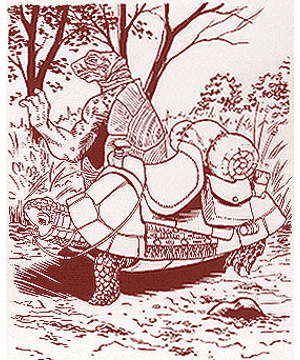

MC Savage Coast Appendix

| Climate/Terrain: | Forest, shorelines |
|---|---|
| Frequency: | Uncommon |
| Organization: | Solitary |
| Activity Cycle: | Day |
| Diet: | Omnivore |
| Intelligence: | Animal (1) |
| Treasure: | Nil |
| Alignment: | Neutral |
| No. Appearing: | 1 |
| Armor Class: | 5 (6) |
| Movement: | 6, Sw 18 |
| Hit Dice: | 3 |
| THAC0: | 17 |
| No. of Attacks: | 1 |
| Damage/Attack: | 3d4 |
| Special Attacks: | Sever hand or foot |
| Special Defenses: | Nil |
| Magic Resistance: | Nil |
| Size: | L (10-12’ long) |
| Morale: | Average (8-10) |
| XP Value: | 270 |
These large, turtlelike creatures serve as mounts for the more intelligent tortles. Nikt’oos are amphibians, and their shells are just hard layers of leathery skin underlaid with large, bony plates. The skin of a nikt’oo is usually olive, and its back is spotted with brown and yellow. Their large, round eyes are deep black in color. Nikt’oos are longer and stronger than horses, though only half as high. An adult female nikt’oo will often weigh more than 2,500 pounds.
Their feet make nikt’oos slow land creatures, though they can swim faster than many fish (above or under the water). These strong creatures can run for days without rest and, at half their normal movement, swim indefinitely (eating and even sleeping while they move, waking just long enough to make course corrections). A nikt’oo can carry up to 600 pounds without slowing, up to 900 pounds at half speed, and up to 1,200 pounds at 1/3 normal movement speed.
Combat: A nikt’oo can deliver a vicious bite, and on an unadjusted roll of 20, it severs the hand or foot of an attacking man-sized or smaller creature. These giant creatures are usually quite passive, not biting unless severely provoked. However, they can be trained to bite on command. Evil snappers often train their mounts to behave this way.
Because nikt’oos do not have shells, they cannot their head and limbs for protection. They have bony heads and backs, which are AC 5. The legs are the most vulnerable parts (AC 6 instead of AC 5). Opponents near the extremities of a nikt’oo are assumed to strike these vulnerable areas.
Habitat/Society: Most nikt’oos are domesticated and can be found in the company of tortles or snappers. The small number of wild nikt’oos tend to be very skittish of humanoids, fleeing if given an opportunity. During mating season, all nikt’oos become aggressive and bad tempered.
Sailing ships sometimes encounter nikt’oos far out in the ocean. Nikt’oos out in the ocean seem to be more relaxed and will sometimes swim parallel to a sailing ship. Sailors believe that a major curse will befall anyone who kills such a nikt’oo.
A properly trained female nikt’oo can be used as an amphibious beast of burden, capable of carrying goods in the water and on land.
Ecology: Wild nikt’oos who reach adulthood live for about 90 years, while domestic nikt’oos often live as long as 150 years. Female nikt’oos each lay 5d6 eggs every year, burying the eggs above the tide line on a warm beach. Hatchlings are extremely vulnerable to disease, ecological contamination, and sea predators. In the wild, less than 5% of nikt’oo offspring survive to reach adulthood.
Male nikt’oos spend most of their lives in the water; they weigh so much that they dislike leaving the water. They will leave the water if the female is threatened while egg-laying. Out of water, they suffer a -2 penalty to hit and suffer 2 points of damage per round from the dryness.
The male and female nikt’oos bellow to each other while the eggs are being laid, providing constant reassurance. Otherwise, the nikt’oos never make any vocal sounds.
For the most part, nikt’oos subsist on jellyfish, mollusks, and seaweed. They are not edible by most humanoid races, but snappers sometimes eat them.
